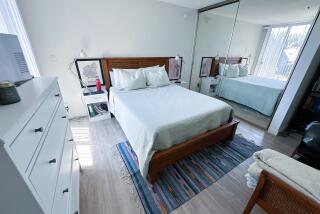Removable paneling can add interest to a bare-bones apartment

Kyle Schuneman shows how to add architecture to an apartment’s decor with a wall of stick-on wood paneling.
- Share via
Features such as fireplaces and wood beams not only look good in a room, they also provide a focal point for decorating. But many apartments lack these architectural elements and instead offer just plain white walls, boxy rooms and open, undefined spaces.
In my 1960s-era unit, for example, living, dining and kitchen areas blend together and lack definition. Temporary plaid wallpaper was a solution in the living room. But the dining room was proving to be a challenge.
The only feature in the room was a single pendant hanging from the ceiling. Without another anchor, the dining table and chairs seemed to float in the space. The area needed something with more texture to differentiate it.
PHOTOS: Adding removable paneling, step-by-step
Then I found out about a product called Stikwood: solid wood paneling with strips of peel-and-stick backing. It seemed perfect for my needs. The planks come in a variety of finishes, including reclaimed wood, which went well with my industrial-looking dining table and had a masculine vibe.
But there was a stumbling block. Stikwood, available online at www.stikwood.com, is considered permanent; the adhesive lasts 10 years. Translation: not rental-friendly.
My work-around was to apply strips of painters tape with a clear matte polyurethane coating to the wall. Then I adhered the planks’ adhesive strips to the tape. (I did a test, and the planks came off easily with the tape attached to them.) When I’m ready to move, I can just pull off the planks. To make the removal process easier, I made the planks no longer than 24 inches.
This is not the cheapest project ($8 to $12.50 per square foot), so you’ll want to select a strategic wall to get the most bang for your buck. But in the end, you’ll have a textured, creative fixture that gives even the most basic space some architectural interest.
How to panel an apartment wall
How to apply horizontal paneling to your wall using the painter’s tape method. The supplies and tools listed are for covering an 8-by-10-foot wall.
Sponge
Stikwood paneling
Tape measure
Pencil
24-inch level
2 rolls of 2-inch painter’s tape
1 quart of clear matte polyurethane
2-inch paint brush
Hacksaw, miter saw or miter box
Heavy book
1. Remove any nails from your wall and wipe down the surface with a damp sponge to remove loose debris or dust. Let it dry for 30 minutes.
2. On the back of a Stikwood plank, measure the distance between the middle of one adhesive strip to the middle of the next strip (2 inches on my boards). Using a pencil and a level, draw lines the same distance apart across the width of the wall from ceiling to floor.
3. Now apply strips of 2-inch painter’s tape over the penciled-in lines across your wall. The finished wall will be horizontally striped with tape.
4. With a 2-inch foam brush, spread a thin layer of clear matte polyurethane over the edges of the tape to seal it to the wall, giving the tape stronger adhesion.
5. Peel the backing off the adhesive strips on a wood plank, align the strips with the tape on the wall and press the board to the wall. Repeat across and down the wall.
6. You’ll need to trim some of the boards to fit or to create the pattern you like. Though the company suggests using a miter saw or box, I found a hacksaw sufficient to cut the thin wood. I marked a line on the plank where I needed to make the cut and laid the plank on a table, letting the section to be trimmed hang off the edge. For more stability when cutting, I laid a heavy book on the board as a counterweight.
ALSO:
How to turn an apartment closet into an office
Going ‘Behind Closed Doors’ with creative minds
Rhea Perlman and designer meditate on an artful space
JOIN THE CONVERSATION: @latimeshome | pinterest.com/latimeshome | facebook.com/latimeshome | facebook.com/latimesgarden


